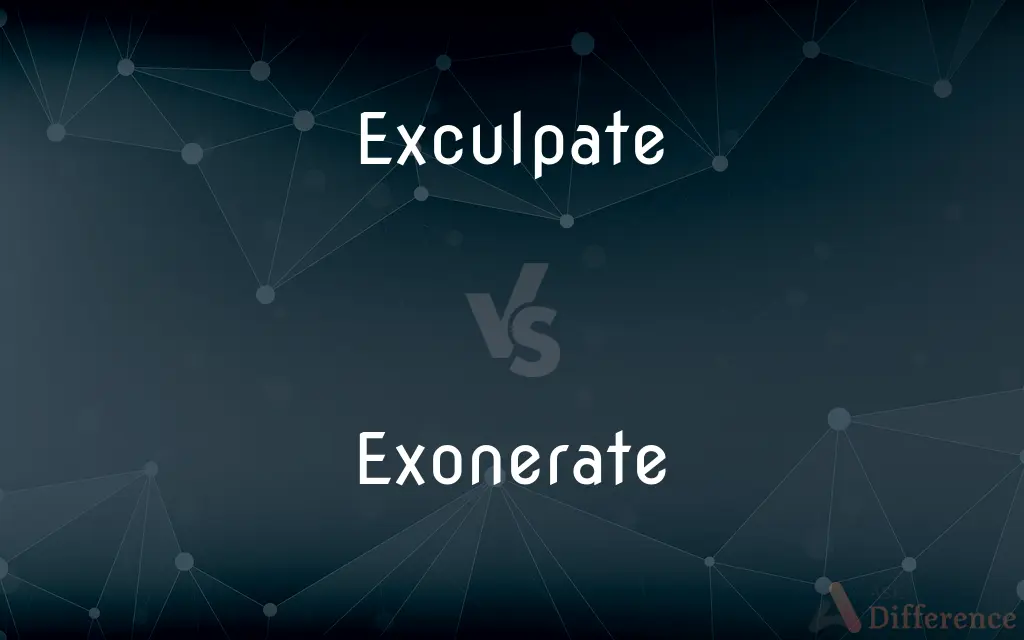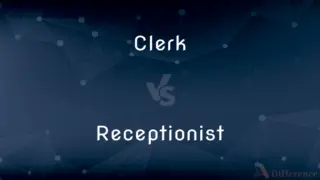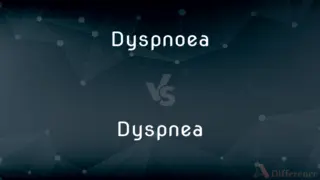Exculpate vs. Exonerate — What's the Difference?
By Maham Liaqat & Urooj Arif — Updated on April 25, 2024
Exculpate and exonerate both involve clearing someone from blame, while exculpate implies no evidence of guilt whereas exonerate suggests removing an already established blame.

Difference Between Exculpate and Exonerate
Table of Contents
ADVERTISEMENT
Key Differences
Exculpate is used to describe the act of showing that someone is not guilty of a crime or misconduct, often suggesting that there was never any evidence implicating the individual. On the other hand, exonerate is typically used when there is an implication of clearing from alleged fault or guilt after evidence to the contrary is considered or proven. This can often involve a legal or formal declaration.
In legal contexts, to exculpate someone usually means demonstrating their innocence by proving a lack of connection with the crime, often through evidence that absolves them from any wrongdoing. Whereas, to exonerate someone can involve a process where previous convictions are overturned or accusations are formally declared unwarranted, often after new evidence supports the innocence of the accused.
Exculpation can sometimes simply involve absence of evidence linking a person to a crime, suggesting that the person should never have been associated with the crime in the first place. Conversely, exoneration might come into play after someone has been wrongfully accused, charged, or even convicted, highlighting a restoration of reputation and legal status.
The term "exculpate" tends to focus more on the proof of innocence rather than the removal of guilt, implying that the individual was erroneously involved in the legal issue. In contrast, "exonerate" involves the process of being freed from all responsibilities and penalties after such accusations, emphasizing a return to a state of being unblemished by the charges.
Both exculpate and exonerate carry significant emotional and societal impacts for the individual involved. Being exculpated can prevent the personal and social turmoil of a criminal trial, while being exonerated might restore one's standing in the community and often comes with a sense of vindication after a period of suspicion or legal battle.
ADVERTISEMENT
Comparison Chart
Definition
To show that someone is not guilty of wrongdoing.
To officially absolve someone from blame.
Implication in Law
No evidence of guilt from the start.
Removal of guilt after evidence is reviewed.
Association with Guilt
Implies innocence is evident throughout.
Often involves reversing a previous accusation.
Emotional Impact
Prevents legal and social consequences.
Restores reputation and relieves legal burdens.
Usage Context
Generally used before any trial or accusation.
Used post-accusation or post-conviction.
Compare with Definitions
Exculpate
To clear from a charge of guilt.
The new evidence served to exculpate the defendant from any wrongdoing.
Exonerate
To free from guilt or blame after evidence is considered.
After reviewing the case, the judge decided to exonerate the prisoner.
Exculpate
To declare someone free from blame.
Witnesses were able to exculpate her by confirming her alibi.
Exonerate
To absolve someone from charges in a formal setting.
The board held a meeting to exonerate the director from the financial discrepancies.
Exculpate
To vindicate from accusation or suspicion.
His consistent track record might exculpate him from any suspicions of fraud.
Exonerate
To restore one’s good name.
The public apology helped to exonerate the celebrity from the scandal.
Exculpate
To absolve someone from any fault.
The CCTV footage helped to exculpate the suspect who was miles away from the crime scene.
Exonerate
To lift a burden of guilt from someone.
The witness's testimony could exonerate him from the crime.
Exculpate
To free someone from criminal charges.
The forensic report was used to exculpate the accused from the burglary case.
Exonerate
To clear from accusations or wrongdoing officially.
The new law may exonerate those who were convicted unjustly.
Exculpate
Show or declare that (someone) is not guilty of wrongdoing
The article exculpated the mayor
Exonerate
(of an official body) absolve (someone) from blame for a fault or wrongdoing
They should exonerate these men from this crime
An inquiry exonerated those involved
Exculpate
To clear of guilt or blame.
Exonerate
Release someone from (a duty or obligation)
Pope Clement V exonerated the king from his oath to the barons
Exculpate
To clear of or to free from guilt; exonerate.
Exonerate
To free from blame.
Exculpate
To clear from alleged fault or guilt; to prove to be guiltless; to relieve of blame; to acquit.
He exculpated himself from being the author of the heroic epistle.
I exculpate him further for his writing against me.
Exonerate
To free from a responsibility, obligation, or task.
Exculpate
Pronounce not guilty of criminal charges;
The suspect was cleared of the murder charges
Exonerate
To relieve (someone or something) of a load; to unburden (a load).
Exonerate
Of a body of water: to discharge or empty (itself).
Exonerate
(transitive) To free (someone) from an obligation, responsibility or task.
Exonerate
(transitive) To free (someone) from accusation or blame.
Exonerate
(archaic) Freed from an obligation; freed from accusation or blame; acquitted, exonerated.
Exonerate
To unload; to disburden; to discharge.
All exonerate themselves into one common duct.
Exonerate
To relieve, in a moral sense, as of a charge, obligation, or load of blame resting on one; to clear of something that lies upon oppresses one, as an accusation or imputation; as, to exonerate one's self from blame, or from the charge of avarice.
Exonerate
To discharge from duty or obligation, as a bail.
Exonerate
Pronounce not guilty of criminal charges;
The suspect was cleared of the murder charges
Common Curiosities
Can exculpation occur without a trial?
Yes, exculpation can occur without a trial if evidence shows no connection of the person with the crime.
What is the difference between exculpating evidence and exonerating evidence?
Exculpating evidence proves innocence, typically showing no initial wrongdoing; exonerating evidence often clears a person from a previously held blame or conviction.
Is exoneration possible after a conviction?
Yes, individuals can be exonerated even after a conviction, often when new evidence proves their innocence.
How do the roles of a defense attorney differ in seeking to exculpate or exonerate a client?
A defense attorney seeks to exculpate by showing lack of guilt from the beginning, while they aim to exonerate by overturning an existing accusation or conviction.
What does it mean to exculpate someone?
To exculpate someone means to show that they are not guilty of a charge or accusation.
Can media play a role in the exoneration process?
Media can influence public perception and bring attention to evidence that might lead to exoneration.
What are the psychological impacts of being exculpated or exonerated?
Both can relieve psychological stress, though exoneration might come with greater emotional relief after a period of legal struggle.
Does exonerate imply a legal process?
Yes, exonerate often implies a formal legal process to reverse convictions or clear accusations.
Are there any famous cases where exoneration played a key role?
Numerous cases, especially those involving wrongful convictions highlighted by projects like the Innocence Project, show the critical role of exoneration.
Does public opinion impact the process of exculpation or exoneration?
Public opinion can significantly influence the perception of the process, especially in high-profile cases, though it should not impact the legal proceedings directly.
Share Your Discovery

Previous Comparison
Clerk vs. Receptionist
Next Comparison
Dyspnoea vs. DyspneaAuthor Spotlight
Written by
Maham LiaqatCo-written by
Urooj ArifUrooj is a skilled content writer at Ask Difference, known for her exceptional ability to simplify complex topics into engaging and informative content. With a passion for research and a flair for clear, concise writing, she consistently delivers articles that resonate with our diverse audience.
















































